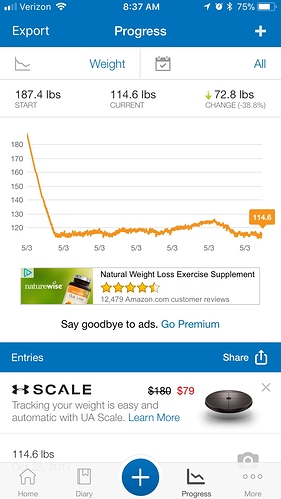I’ve seen many people recommend 70-75% dietary fat intake, even to those morbidly obese like myself.
I found this interesting, in the following video where Phinney talks about those losing weight on the ketogenic diet.
Phinney gave an example of a person losing weight whose BMR was 2800. He suggested a dietary intake of 1400 calories, and that adipose tissue contribute 50% of the total energy the body consumes.
The other 50%, the dietary intake of 1400 calories, was split into half fat and half protein + carbs. The dietary intake of fat therefore amounts to a total of 25% of the total energy the body consumes.
Between the adipose tissue and dietary fat, this amounts to 75% of the total energy the body uses.
Basically, what I got from the video is when you are obese (morbidly obese in my case) and doing this, and properly in ketosis, your body should feel pretty satiated off of body fat and less dietary fat is needed. He said as you lose weight, you might become more hungry for dietary fat, and then should up the percentage of dietary fat consumed over time, to satiation. And ultimately when you are at a desirable weight, then that’s when 75% of your dietary intake is fat.
If this is the case, then I should just eat 80g of protein and 30g of carbs per day (my personal thresholds), and any fat that comes along with the protein, which interestingly comes to about 50% fat from what I’ve seen in my logs. [I’ve been eating lot of fatty treats to where my macronutrient percentage of dietary fat is as high as 75%.]
Some thoughts/ideas I have:
Maybe Jimmy Moore is still heavy because he’s just eating too much fat instead of giving body a chance to happily feed off adipose tissue instead? Also guessing he probably regularly eats too much protein, as even 3-4 oz of steak is usually more than enough protein than the average body can use in a given meal, the excess being converted to glucose – and he’s extremely insulin resistant according to his HOMA-IR; I know he loves very large steaks with extreme amounts of butter. If I recall correctly, in Keto Clarity he never mentioned the possibility of limiting fat intake of morbidly obese person to 50% of dietary intake.
Also, I read in the Obesity Code that Dr. Fung says that even dietary fat raises insulin levels – although at a much lower rate than carbs/excess protein. And if a morbidly obese person eats a very excessive amount of it (like Jimmy and myself have), I’d figure that adds up to at least some worsened insulin resistance. Whereas, fat from adipose tissue is a result of lowered insulin levels, that’s how it escapes the fat cells and at just the right amount… not bombarded by a huge amount of chylomicrons from ingested fat all at once, especially in one sitting, which I am guessing takes insulin to store so there isn’t excessive fat in the blood; this is speculative, as I have no idea how the body throttles digestion of fats, but regardless Fung did say ingested fat does raise insulin levels… whereas adipose fat in blood stream is a result of lowered insulin levels.




